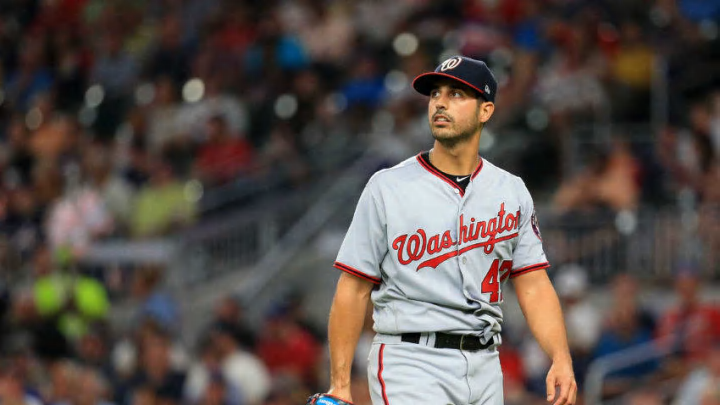The Washington Nationals typically boast one of the best pitching staffs in the league, but they could regress in 2018. Here is why.
Throughout Mike Rizzo’s regime as general manager, the Washington Nationals have prided themselves on pitching. They have boasted elite pitching staffs for several years now, and pitching has played a significant role in their sustained success.
2017 was a poster season for the Nats’ rotation, as Max Scherzer and Stephen Strasburg were both finalists for the Cy Young Award, with Scherzer winning the award for the second consecutive season. However, despite the fact that four of the five starting pitchers from 2017 will return in 2018, they may not enjoy as much success.
The Nats finished 2017 with a strong bullpen, but that was made possible by Rizzo’s mid-season wizardry. Before acquiring Sean Doolittle, Ryan Madson, and Brandon Kintzler, the Nats owned the league’s worst bullpen.
In an effort to avoid the bullpen as much as possible, manager Dusty Baker overused the starting rotation. At certain points in the first half, Scherzer, Strasburg, and Gio Gonzalez could all be found in the top five of the innings pitched leaderboard.
More from District on Deck
- Latest DraftKings Sportsbook Promo Code in Maryland: Bet $5, Win $200 Guaranteed
- Nationals Claim Jeter Downs Off Waivers
- Washington Nationals Minor League Spotlight: Robert Hassell III
- Washington Nationals Tuesday Q&A
- 3 Free Agents the Nationals Should Gamble On
Everything eventually settled down a bit, but the Nats’ starting pitchers were still overworked. At the end of the year, Scherzer, Strasburg, Gonzalez, and Tanner Roark were all ranked in the top 20 for innings pitched among National League pitchers, with Gonzalez and Scherzer in the top ten.
This is alarming in itself, but each individual pitcher carries their own red flags heading into 2018.
Scherzer, the Nats’ ace and workhorse, threw 200.2 innings in the regular season and another 7.1 in the postseason. His 200.2 regular season innings marked his fifth consecutive season eclipsing 200 innings.
Pitching 200 innings is remarkable in today’s game, yet Scherzer does it every year. Add in the fact that he is entering his age-33 season, and it becomes obvious that he may be beginning to decline in the foreseeable future.
Strasburg could also be a candidate to regress in 2018. His 175.1 innings pitched in the 2017 regular season were easily his most since 2014. Part of what enabled him to pitch so many innings in 2017 was his ability to remain somewhat healthy for most of the year, something he has not been able to do in previous seasons.
If history tells us anything, it may be difficult for Strasburg to remain healthy again in 2018. Between missing time for injuries and attempting to get back into the swing of things after an injury, he may regress a bit in 2018.
Gonzalez, the Nats’ lone left-hander in the rotation, can be a bit erratic at times, but had his best season in recent memory in 2017. He eclipsed 200 innings for the first time in a Nats uniform, and finished sixth in Cy Young Award voting.
However, Gonzalez struggled towards the end of the season, pitching to a 5.47 ERA in his final five starts. Perhaps this was just a bad stretch and nothing to read too much into, but it could also signal regression to come in 2018. His peripherals were not great either, which causes a bit of concern heading into the upcoming season.
Finally, Roark is a candidate to regress in 2018. While representing Team USA in the 2017 World Baseball Classic, he pitched meaningful and stressful innings while most players were playing in exhibition games. Between the WBC and the regular season, he nearly pitched 200 meaningful innings without a typical Spring Training, which possibly caused diminished results in 2017 and could do the same in 2018.
Roark also relied his curveball and slider more than ever before in 2017. Curveballs and sliders are two of the most damaging pitches to the elbow, and Roark set career-highs in usage for both in 2017. Between pitching additional meaningful innings and throwing more breaking balls, 2017 was very taxing on Roark’s arm, which could lead to regression in 2018.
The Nats are also going to be without pitching coach Mike Maddux in 2018. The pitching staff routinely praised “Mad Dog” during his time in DC, but he will be working with the Cardinals in 2018. This is not a knock on new pitching coach Derek Lilliquist, but Maddux is among the best in the game.
Next: Nats' quiet off-season nothing to worry about
Although the Nats possess one of the league’s best pitching staffs, there is some cause for concern heading into 2018. In today’s game, when pitchers are suffering injuries at an unprecedented rate, the Nats’ training staff could be exceptionally busy.
